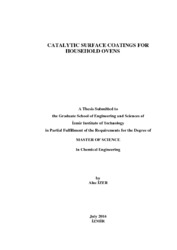Please use this identifier to cite or link to this item:
https://hdl.handle.net/11147/2754Full metadata record
| DC Field | Value | Language |
|---|---|---|
| dc.contributor.advisor | Şeker, Erol | - |
| dc.contributor.advisor | Şeker, Erol | - |
| dc.contributor.author | İzer, Alaz | - |
| dc.date.accessioned | 2017-01-11T12:09:06Z | |
| dc.date.available | 2017-01-11T12:09:06Z | |
| dc.date.issued | 2016-07 | - |
| dc.identifier.citation | İzer, A. (2016). Catalytic surface coatings for household ovens. Unpublished master's thesis, Izmir Institute of Technology, Izmir, Turkey | en_US |
| dc.identifier.uri | http://hdl.handle.net/11147/2754 | - |
| dc.description | Thesis (Master)--Izmir Institute of Technology, Chemical Engineering, Izmir, 2016 | en_US |
| dc.description | Includes bibliographical references (leaves: 51-53) | en_US |
| dc.description | Text in English; Abstract: Turkish and English | en_US |
| dc.description | x, 53 leaves | en_US |
| dc.description.abstract | The emission of harmful volatile compounds, such as aldehydes, and also carbon monoxide could occur during cooking processes at home or industry due to the combustion and cracking of spilled vegetable oil on the walls of an oven. It is known that the by-products generated during cooking could affect human health and environment if they are properly vented or removed. To eliminate the health and environmental problems related to oven emission, self-cleaning catalytic materials coated walls for ovens seem to be viable alternative to the toxic and time consuming chemical cleaning solutions. In this project, a sol-gel method and also the dip coating technique was used to produce a catalytic material coated aluminum plates. Specifically, the calcination time and the temperature were studied to better understand the relationship between the textural/chemical properties of the catalyst coated metal plates and their catalytic activities. The studied calcination temperatures were 450°C, 500°C and 550°C whereas the calcination time were 10 min, 30 min and 60 min for each type of catalyst. Aluminum oxide supported nickel and also aluminum oxide - manganese oxide supported nickel catalysts were prepared as the catalyst that were used in coating. The catalytic activities of the catalyst coated plates were determined using canola oil as a function of reaction time which were 1h at 170°C and 200°C. The results have been shown that the most convenient calcination conditions for the canola oil combustion were 500°C for 30 minutes by using aluminum oxide – manganese oxide supported nickel catalyst. | en_US |
| dc.description.abstract | Evlerde veya endüstride yemek yapılma sürecinde aldehit, karbon monoksit gibi birçok zararlı kimyasal uçucu bileşik ortaya çıkmaktadır. Bu uçucu kimyasallar yemek pişirilmesi esnasında fırınların yüzeylerine yapışıp birikmektedirler. Bu durum hem kimyasal açıdan insan sağlığını tehdit ederken, diğer bir yandan temizlik ürünleri kullanımını arttırmakta, mali ve iş gücü bakımından israfa yol açmaktadır. Aynı zamanda açığa çıkan kimyasal uçucu bileşikler doğaya da zarar vermekte, atmosferde sera etkisi yaratmaktadır. Bu sebeplerden dolayı, yemek pişirilmesi esnasında ortaya çıkan zararlı gazların veya partiküllerin ortadan kaldırılması gerekmektedir. Bu bağlamda kendi kendini temizleyen fırın teknolojisi, insan ve çevre sağlığı, aynı zamanda ekonomik getirisi açısından önemli bir rol oynamaktadır. Bu çalışmada, ev tipi fırınlar için kendi kendine temizlemeyi sağlayan kaplama malzemeleri üretimi çalışılmıştır. Bu kaplamalar sayesinde, yemek pişirilmesi esnasında ortaya çıkıp, fırın duvarlarına yapışan, yağ damlalarının ve yağ buharının, uçucu ve zararlı hidrokarbonlara dönüşmeden kontrollü miktarlarda karbon dioksite çevrilerek, ortamdan uzaklaştırılması hedeflenmiştir. Kaplama malzemeleri katalitik malzemeler olup sol-jel tekniğiyle hazırlanmıştır. Çalışılan kaplama malzemeleri alüminyum oksit destekli nikel katalizörü ve alüminyum oksit – manganez oksit destekli nikel katalizörüdür. Fırın yüzeyini simüle etmek amacıyla katalizörler alüminyum plakalara sabit daldırma ve çıkarma hızıyla kaplanmıştır. Kalsinasyon sıcaklığı ve süresi çalışılarak kaplana katalizörlerin kimyasal ve yüzeysel özelliklerinin daha iyi anlaşılması hedeflenmiştir. Çalışılan kalsinasyon sıcaklıkları 450°C, 500°C and 550°C ve süreleri ise 10 dk, 30 dk ve 1 saattir. Kanola yağının plakalar üzerindeki yanma reaksiyonu gözlemlenmiş ve maksimum dönüşüm alüminyum oksit – manganez oksit destekli nikel katalizörü ile 84% olarak gözlemlenirken, alüminyum oksit destekli nikel katalizör maksimum 73% yağ dönüşümü sağlamıştır. | en_US |
| dc.language.iso | en | en_US |
| dc.publisher | Izmir Institute of Technology | en_US |
| dc.rights | info:eu-repo/semantics/openAccess | en_US |
| dc.subject | Catalytic materials | en_US |
| dc.subject | Sol-Gel | en_US |
| dc.subject | Volatile organic compounds | en_US |
| dc.subject | Catalysts | en_US |
| dc.subject | Metal oxides | en_US |
| dc.subject | Aluminum | en_US |
| dc.title | Catalytic Surface Coatings for Household Ovens | en_US |
| dc.title.alternative | Ev Tipi Fırınlar için Katalitik Yüzey Kaplamaları | en_US |
| dc.type | Master Thesis | en_US |
| dc.institutionauthor | İzer, Alaz | - |
| dc.department | Thesis (Master)--İzmir Institute of Technology, Chemical Engineering | en_US |
| dc.relation.publicationcategory | Tez | en_US |
| dc.identifier.wosquality | N/A | - |
| dc.identifier.scopusquality | N/A | - |
| item.openairecristype | http://purl.org/coar/resource_type/c_18cf | - |
| item.languageiso639-1 | en | - |
| item.openairetype | Master Thesis | - |
| item.grantfulltext | open | - |
| item.fulltext | With Fulltext | - |
| item.cerifentitytype | Publications | - |
| Appears in Collections: | Master Degree / Yüksek Lisans Tezleri Sürdürülebilir Yeşil Kampüs Koleksiyonu / Sustainable Green Campus Collection | |
Files in This Item:
| File | Description | Size | Format | |
|---|---|---|---|---|
| T001452.pdf | MasterThesis | 1.76 MB | Adobe PDF |  View/Open |
CORE Recommender
Page view(s)
264
checked on Mar 31, 2025
Download(s)
108
checked on Mar 31, 2025
Google ScholarTM
Check
Items in GCRIS Repository are protected by copyright, with all rights reserved, unless otherwise indicated.